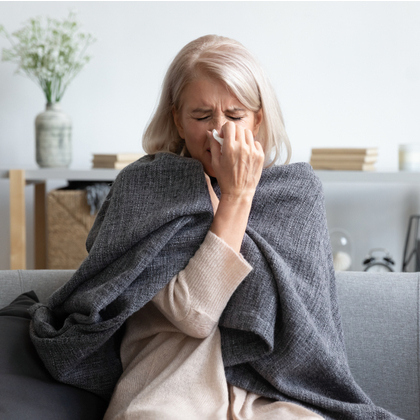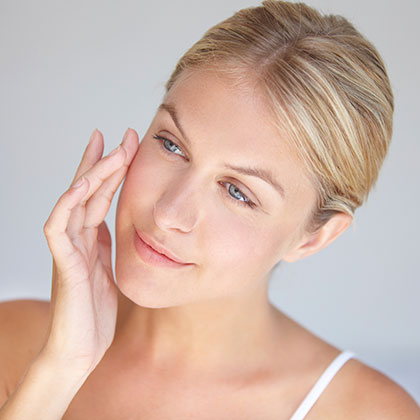Getting older is a fact of life for all of us, under normal circumstances. And thanks to improvements in our lifestyle, more of us are living longer than ever before.
The latest figures from the Office of National Statistics (i) suggest the average man in the UK has a life expectancy of 79.3 years, while the average woman can expect to live to 82.9 years More people are also living extremely long lives, with the latest statistics showing that 579,776 people in the UK were aged 90 or older in 2018, and 13,170 aged 100 or older (ii).
But while some of the signs of ageing are obvious – a few wrinkles or greying hair, for instance, or perhaps a little extra weight around the middle – other changes that take place in the body may not be so noticeable (not, that is, until they start causing problems).
So what happens to the body during ageing? Here’s a quick look at just some of the processes your body goes through as you get older:
Skin
As you age, your body’s production of proteins called collagen and elastin naturally slows down (this commonly starts happening as early as in your mid-30s). When this happens, your skin can gradually become thinner, more fragile and less firm, resulting in fine lines, wrinkles and sagging. Sun damage can be a major contributor to premature ageing of the skin, so it’s important to understand how the sun affects your skin, to know how to protect it.
Bones
After the age of 50, your bones start to thin faster, which makes them more susceptible to fracture. This is also a natural process, but certain factors can speed it up, including smoking, drinking an excessive amount of alcohol, being inactive and having a diet that’s low in calcium and vitamin D.
Joints
Changes in the cartilage in your joints – the tissue that covers the ends of the bones in your joints – mean your knees, hips and other joints become less resistant to wear and tear as you get older, causing the symptoms of osteoarthritis. If you’re overweight, your risk of developing osteoarthritis may be higher than normal.
Muscles
Your muscle tissue naturally declines a little as you age. Plus older people tend to be less active than those who are younger, which can have an effect on their muscles, making them smaller and weaker. Staying active, however, could help you keep stronger for longer.
Heart
With age, your artery walls become thicker and less elastic, and the plaque levels in your arteries can increase, especially if you have high cholesterol levels. Blood pressure also tends to get higher with age, which can damage your blood vessels.
Immune system
Your immunity becomes more sluggish as you get older as your body produces fewer antibodies that fight off threats such as bacteria and viruses.
The good news is, despite all these natural biological changes, there are ways to age healthily – the most important of which may be to lead a healthy lifestyle.
Age-proof your lifestyle
Following a healthy lifestyle isn’t just good for your general health, it may help you age more healthily too. An optimistic mental attitude is essential, as studies suggest people who perceive ageing as a positive experience may live longer than those who don’t (iii). Limiting the amount of time you spend in the sun without sun protection may also help your skin remain wrinkle-free for longer, as can smoking and drinking less alcohol.
Your diet can help with healthy ageing too. Here’s what you should be eating more of:
Olive oil
If you’re not doing so already, switch to olive oil instead of butter as it may help keep your heart more healthy. That’s because olive oil contains antioxidants called polyphenols that have been linked to boosting heart health.
Lean meat, fish and vegetable protein
Muscle mass naturally starts to decline when you hit your 40s, which means it’s more important than ever to make sure you’re getting plenty of protein in your diet as you get older. Try to make your fish the oily type, as it’s rich in heart-friendly omega-3 fatty acids (oily fish also contains vitamin D, which may be in shorter-than-usual supply as you get older). Low-fat dairy foods are recommended too, as they contain bone-strengthening calcium.
Berries
The antioxidants found in fruits such as blueberries, blackberries and raspberries are believed to help keep your brain and memory working more effectively, while their vitamin C – also an antioxidant – may be good for keeping your skin smooth.
Whole grains
Whole grains - such as whole wheat, oats and brown rice – are good sources of dietary fibre, which according to the American Heart Association may help improve your cholesterol levels as well as lower your risk of heart disease, stroke and type 2 diabetes, as well as help you to manage your weight (iv).
Dark green vegetables
Spinach, kale and other dark leafy greens are good sources of antioxidants called lutein and zeaxanthin, which could help keep your vision in good condition. They also contain vitamin K, which may help boost your bone strength. In fact, eat as many colourful fruits and vegetables as possible to improve your antioxidant intake as you get older, as antioxidants are thought by some to help fight substances in the body linked with ageing.
Meanwhile, regular physical activity is as important in older age as it is when you were younger – and the good news is, it’s never too late to start exercising to reap the health benefits. According to the NHS, many adults aged 65 and older spend 10 hours or more a day on average either sitting or lying down (v), and the result is higher levels of obesity and heart disease – among other things. People who are active have a lower risk of heart disease, stroke, type 2 diabetes, some cancers, depression and dementia, so taking regular exercise is well worth the effort.
Aim for 150 minutes or more of moderate-intensity exercise a week, such as brisk walking, cycling and pushing a lawn mower. It’s also recommended that you do some strength-boosting exercise, such as weight training, heavy gardening or any other activity where you carry heavy loads. Above all, try to reduce the amount of time you spend sitting around every day, and use every opportunity to do something active, even if it’s only for a few minutes at a time.
How to tackle five common age signs
Nobody is getting any younger. But there are some things you can act on that may be putting years on you. Here are five of the things that can age you as you get older, as well as how to turn back time:
-
Posture
Good posture can make you look youthful and take pounds off you, but if you’re slouched, hunched or bent over, you’ll seem years older. There are several reasons why bad posture develops – you may have had an injury, for instance, or perhaps you have stiffness in your back, neck, hips or knees that makes you hold yourself awkwardly to reduce the pain. Often, however, poor posture is a result of bad habits, so try not to slouch when you sit or stand by keeping your back upright. Read more about common posture mistakes and fixes on NHS.uk.
-
Hearing
According to Action on Hearing Loss, more than 40 per cent of people over the age of 50 have some level of hearing loss, rising to 71 per cent of people over the age of 70 (vi). Yet only 40 per cent of people who could be benefitting from better hearing by wearing a hearing aid actually have one. While admitting that you have a hearing problem might make you feel old, doing something about it and improving your hearing could help you feel years younger. The first step is to check whether you have a hearing problem. One easy way to do this is to take the Action on Hearing Loss hearing check. Partial or even complete hearing loss can be a difficult part of ageing, so understanding its causes and treatments can be the first step towards managing it.
-
Sun spots
Often called liver spots or age spots, these are blotches of pigmentation found on your face and on the backs of your hands. Sunspots – so called because they’re caused by sun exposure – are very common in people aged 50 and older. Using sunscreen every day will help stop new sun spots from forming and prevent any pigmentation you already have from getting worse: use a product that has SPF15 or higher plus a four-star UVA rating.
-
Muscle weakness
When your muscles grow weak and flexible, you don’t just move like an old person, you may also be more likely to have a fall. Regular exercise is the best way to keep your body strong and flexible. Ask your GP for a referral to your local gym. Or try something not too strenuous, like swimming, walking or a local yoga class.
-
Varicose veins
You can get varicose veins at any age, but they’re more likely to develop as you get older. These are veins that have lost their elasticity and become swollen with blood, and according to the NHS one in three adults is affected by them (vii). Reduce the symptoms and prevent the onset of varicose veins by wearing support tights. Taking up light exercise and keeping your legs raised at the end of the day can also help, as can eating a healthy diet with plenty of fruit and vegetables.
Getting older: how to stay happy
The older you become, the better you may get at managing life’s ups and downs. However, an increasing number of older people are finding it more difficult to cope, and depression statistics among this age group are high (according to a the Mental Health Foundation, depression affects one in five older people living in the community, and two in five living in care homes (viii)).
This may be happening because depression can be a side effect of physical illness such as stroke, diabetes or cancer. Older people may have to deal with bereavement and the social isolation that can come with retirement too.
If you want to avoid life getting you down, here are some tips on how to stay happy, whatever your age:
Talk about it
Friendships and family relationships can be the best defence against depression. But sometimes it can be hard to talk about your problems to the people who know you well, which is where counselling can help. Many GP’s surgeries have a counselling service, or you could try contacting a mental health charity such as Mind. If you’re finding it hard to cope following a bereavement, talk to one of the counsellors at Cruse Bereavement Care.
Stay active
Some studies suggest exercise may be more effective than drugs in treating mild to moderate depression (ix). Experts believe physical activity has the same effect as taking antidepressants because it stimulates your brain to produce feel-good hormones. If you’re not sure about how to start exercising – or if you have a medical condition – ask your GP to suggest a safe exercise programme that suits your lifestyle.
Discover new interests
The change of lifestyle that comes with retirement can often lead to depression among the over-65s, who may suddenly find themselves without any purpose in life. Finding new interests or hobbies, however could help you feel more fulfilled.
Eat good mood foods
Certain foods can boost chemicals in your brain that make you feel good, including turkey, chicken, beans, avocados, bananas and cottage cheese. Also try eating at least two portions of oily fish each week, as a lack of omega-3 fatty acids found in oily fish has been linked with depression.
Don’t drown your sorrows
While you may feel that having a few drinks makes you feel better in the short term, the Drinkaware campaign suggests people who drink heavily and regularly are likely to develop some symptoms of depression (x). So stick within sensible drinking limits set by the government: no more than 14 units a week for both men and women spread evenly over at least three days (find out more about alcohol units at drinkaware.co.uk).
Natural support for ageing
While they may not help you turn back the clock, several natural supplement may support you as you get older and help to make the ageing process a positive one.
Anthocyanidins
It’s widely accepted that collagen production in the body slows down as you get older – and since collagen is the substance that gives your skin structure, this explains why older skin tends to be less firm than that of a young person. Substances called anthocyanidins – powerful antioxidants belonging to the flavonoids family of plant chemicals – are thought to help increase the amount of vitamin C in your body as well as strengthen collagen. They may also boost the production of elastin, a substance that gives skin its elasticity. Anthocyanidins are found in the skin of dark and richly coloured fruit including blueberries, blackberries, raspberries and red grapes (the flavonoids are the pigments that give these fruits their distinctive colour). You can also boost your anthocyanidin intake by taking a nutritional supplement.
Antioxidants
Many experts believe ageing is promoted by oxidative stress, a process that takes place when substances called free radicals overwhelm and damage your cells. Antioxidant nutrients are thought to help counteract this process. Eating a healthy balanced diet that includes at least five portions of fruit and vegetables every day should provide you with a certain level of antioxidants. But if you’re starting to feel your age and need a bit of an antioxidant boost, the following may be worth trying a high-strength multivitamin and mineral. Choose a formulation that includes good levels of the antioxidant nutrients vitamins A, C and E.
Alpha-lipoic acid
Another type of antioxidant, alpha-lipoic acid is both water- and fat-soluble (unlike vitamin E which is only fat-soluble and vitamin C which only dissolves in water). According to experts, this gives lipoic acid an unusually broad spectrum of antioxidant action. There is also evidence that some medical conditions related to ageing – including diabetes and atherosclerosis (hardening of the arteries) – may be linked with low levels of this nutrient (xi).
Green tea extract
Green tea contains high levels of strong antioxidant substances called catechin polyphenols. It continues to be a popular subject with researchers in relation to its effect on a number of age-related conditions, including high cholesterol (xii) and heart disease (xiii).
For more information on how to support your body as you age, feel free to explore the rest of our health information library.
References:
-
Available online: https://www.ons.gov.uk/peoplepopulationandcommunity/birthsdeathsandmarriages/lifeexpectancies/bulletins/nationallifetablesunitedkingdom/2016to2018
-
Available online: https://www.ons.gov.uk/peoplepopulationandcommunity/birthsdeathsandmarriages/ageing/bulletins/estimatesoftheveryoldincludingcentenarians/2002to2018
-
Lee LO et al., Optimism is associated with exceptional longevity in 2 epidemiologic cohorts of men and women. PNAS. 2019 Sep 10;116(37):18357-18362.Available online: https://www.pnas.org/content/116/37/18357
-
Available online: https://www.heart.org/en/healthy-living/healthy-eating/eat-smart/nutrition-basics/whole-grains-refined-grains-and-dietary-fiber
-
Available online: https://www.nhs.uk/live-well/exercise/why-sitting-too-much-is-bad-for-us/
-
Available online: https://www.actiononhearingloss.org.uk/about-us/our-research-and-evidence/facts-and-figures/
-
Available online: https://www.nhsinform.scot/illnesses-and-conditions/heart-and-blood-vessels/conditions/varicose-veins
-
Available online: https://www.mentalhealth.org.uk/publications/how-to-in-later-life
-
Cooney GM. et al., Exercise for depression. Cochrane Database Syst Rev. 2013 Sep 12;(9): CD004366.Available online: https://www.ncbi.nlm.nih.gov/pubmed/24026850
-
Available online: https://www.drinkaware.co.uk/alcohol-facts/health-effects-of-alcohol/mental-health/alcohol-and-mental-health/
-
Kagan. VE, Shvedova A, Serbinova E, et al. Dihydrolipoic acid—a universal antioxidant both in the membrane and in the aqueous phase. Reduction of peroxyl, ascorbyl, and chromanoxyl radicals. Biochem Pharmacol. 1992;44:1637-1649.
-
Xin-Xin Zheng et al., Green tea intake lowers fasting serum total and LDL cholesterol in adults: a meta-analysis of 14 randomized controlled trials. . The American Journal of Clinical Nutrition. 2011 August;94(2):601-610.Available online: https://academic.oup.com/ajcn/article/94/2/601/4597944
-
Kuriyama S. et al., Green tea consumption and mortality due to cardiovascular disease, cancer and all causes in Japan: the Ohsaki study. JAMA. 2006 Sep 13;296(10):1255-65.Available online: https://www.ncbi.nlm.nih.gov/pubmed/16968850
Related Posts
Disclaimer: The information presented by Nature's Best is for informational purposes only. It is based on scientific studies (human, animal, or in vitro), clinical experience, or traditional usage as cited in each article. The results reported may not necessarily occur in all individuals. Self-treatment is not recommended for life-threatening conditions that require medical treatment under a doctor's care. For many of the conditions discussed, treatment with prescription or over the counter medication is also available. Consult your doctor, practitioner, and/or pharmacist for any health problem and before using any supplements or before making any changes in prescribed medications.

Christine
Christine Morgan has been a freelance health and wellbeing journalist for almost 20 years, having written for numerous publications including the Daily Mirror, S Magazine, Top Sante, Healthy, Woman & Home, Zest, Allergy, Healthy Times and Pregnancy & Birth; she has also edited several titles such as Women’ Health, Shine’s Real Health & Beauty and All About Health.
View More



